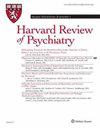Challenges of Agitation in Dementia: A Plea for Early Discussion.
IF 2.5
4区 医学
Q2 PSYCHIATRY
引用次数: 0
Abstract
Abstract Behavioral and psychological symptoms of dementia (BPSD) occur frequently among people with dementia and are known precipitants for placement in care facilities. Despite the social, financial, and psychological impact on dementia care, education and discussions on BPSD have not been routinely included in advance care planning (ACP). As a result, families can face great challenges in making complex medical decisions when their loved ones are admitted to the geriatric psychiatric inpatient unit with refractory BPSD. We present the case of an 83-year-old gentleman with BPSD to illustrate universal struggles in dementia care experienced by many families, which could have been alleviated by education and discussions around BPSD earlier in the patient’s dementia course. A literature search did not yield any articles that mention discussions of BPSD in ACP. The lack of literature referencing BPSD in ACP supports our clinical experiences with the case and highlights the need for improvement in current dementia care. We propose a guideline for providers to facilitate conversations around BPSD as an integral part of ACP, including discussions of four key points related to the progressive nature of dementia, the commonality of BPSD, the lack of FDA-approved treatment for BPSD, and the difficulty in balancing agitation and sedation to allow safe placement. We firmly believe it is important to start discussion on BPSD as part of ACP as early as possible. Early education and discussion will help to facilitate meaningful care decisions as patients and families navigate the challenges associated with this progressive disease.痴呆症中躁动的挑战:早期讨论的请求。
痴呆症的行为和心理症状(BPSD)在痴呆症患者中经常发生,并且是已知的安置在护理机构的前兆。尽管社会、经济和心理对痴呆症护理有影响,但关于BPSD的教育和讨论并没有常规地包括在预先护理计划(ACP)中。因此,当他们的亲人因难治性BPSD入住老年精神科住院病房时,家庭在做出复杂的医疗决定时可能面临巨大的挑战。我们提出了一个83岁的BPSD患者的案例,以说明许多家庭在痴呆症护理中所经历的普遍斗争,这些斗争本可以通过在患者痴呆症病程早期就BPSD进行教育和讨论来缓解。文献检索没有发现任何提及ACP中BPSD讨论的文章。缺乏ACP中BPSD的文献支持了我们的临床经验,并强调了当前痴呆护理的改进需求。作为ACP的一个组成部分,我们提出了一个指导方针,以促进围绕BPSD的对话,包括讨论与痴呆的进行性、BPSD的共性、缺乏fda批准的BPSD治疗以及平衡躁动和镇静以确保安全放置的困难相关的四个关键点。我们坚信,重要的是尽早开始讨论BPSD作为ACP的一部分。早期教育和讨论将有助于促进有意义的护理决策,因为患者和家属应对与这种进行性疾病相关的挑战。
本文章由计算机程序翻译,如有差异,请以英文原文为准。
求助全文
约1分钟内获得全文
求助全文
来源期刊

Harvard Review of Psychiatry
PSYCHIATRY-
CiteScore
7.50
自引率
0.00%
发文量
67
审稿时长
>12 weeks
期刊介绍:
The Harvard Review of Psychiatry is the authoritative source for scholarly reviews and perspectives on important topics in psychiatry. Founded by the Harvard Medical School''s Department of Psychiatry, the Harvard Review of Psychiatry features review papers that summarize and synthesize the key literature in a scholarly and clinically relevant manner. Topics covered include: Schizophrenia and related disorders; Mood disorders; Personality disorders; Substance use disorders; Anxiety; Neuroscience; Psychosocial aspects of psychiatry; Ethics; Psychiatric education; and much more.
In addition, a Clinical Challenges section presents a case with discussion from a panel of experts. Brief reviews are presented in topic-specific columns that include Cross-Cultural Psychiatry, History of Psychiatry, Ethics, and others.
 求助内容:
求助内容: 应助结果提醒方式:
应助结果提醒方式:


